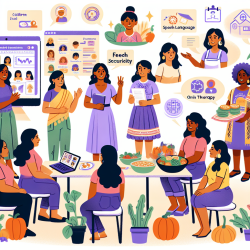Introduction
In the realm of speech-language pathology and therapy services, data-driven decisions are crucial for creating impactful outcomes, especially for children. However, a recent study titled Evaluating the Full Plate Living lifestyle intervention in low-income monolingual Latinas with and without food insecurity provides valuable insights that can be applied to improve practitioners' skills and approaches, particularly in underserved communities.
Understanding the Study
The study focused on a quasi-experimental intervention aimed at improving the physical and mental health of Latinas with and without food insecurity. Conducted in Southern California, it utilized community health workers (CHWs) to deliver a culturally sensitive, multicomponent lifestyle intervention based on the principles of popular education.
Participants included 98 low-income, obese Latinas who were assessed for health behaviors, mental health, and biometric measurements at baseline, immediately post-intervention, and three months later. The intervention demonstrated that both food-insecure and food-secure participants experienced significant improvements in depression, anxiety, and body mass index (BMI) over time.
Key Takeaways for Practitioners
- Community Health Workers (CHWs): This study highlights the effectiveness of CHWs, who, despite not being licensed healthcare professionals, can significantly impact health outcomes with proper training and support.
- Popular Education Approach: The use of popular education, which empowers participants to identify and solve problems collaboratively, proved effective in promoting health among disadvantaged populations.
- Cultural Sensitivity: Tailoring interventions to the cultural context and needs of participants is crucial for success. The study's culturally adapted intervention for Latinas underscores the importance of this approach.
Encouraging Further Research
Practitioners are encouraged to explore similar interventions in their communities, particularly among underserved populations. Further research could focus on long-term sustainability and scaling these interventions to broader Latino communities.
Moreover, the study's findings suggest potential applications in speech-language pathology, particularly in addressing social determinants of health that affect communication and language development in children from food-insecure households.
Conclusion
The study offers promising evidence that culturally sensitive, community-driven interventions can significantly improve health outcomes among food-insecure Latinas. By leveraging the principles of popular education and the support of CHWs, practitioners can contribute to reducing health disparities and enhancing the well-being of underserved populations.
To read the original research paper, please follow this link: Evaluating the Full Plate Living lifestyle intervention in low-income monolingual Latinas with and without food insecurity.










